The Plextor M3 (256GB) Review
by Kristian Vättö on April 5, 2012 3:05 AM ESTPerformance Over Time and TRIM
When Plextor sent the drive in for review, they emphazised one thing: a technology they call "True Speed". Supposedly, its job is to guarantee a high performance experience throughout the lifetime of the drive, and even when the drive is at a dirty state. As this technology is firmware related, we don't know how it differs from what others (e.g. Intel and Crucial) have done.
First, lets get the base performance by running HD Tach on a clean drive:
In a clean state, we get 383MB/s read speeds and 329MB/s write speeds. Next we ran the drive through our torture test, which consists of 20 minutes of 4KB random writes (QD=32, 100% LBA space) run on a full drive:
The M3 is still able to manage an average write speed of ~163MB/s. However, the write speed drops to as low as 50MB/s for the first LBAs, while the peak performance is still easily over 300MB/s. Plextor does noticeably better than Crucial in this regard as the performance of the m4 dropped to an average of 35MB/s. However, it should also be noted that the M3 had a higher write speed to begin with.
I wasn't ready to let Plextor go this easily. To see how the "True Speed" technology really works, I secure erased the drive, filled it with sequential data and then tripled the amount of 4KB random writes to 60 minutes:
The amplitude of the graph is a lot smaller now and there are only two small peaks, compared to the previous graph with dozens of peaks. The performance drop is significant as we are looking at 50MB/s on average regardless of the LBA. At the lowest, the performance is 35-40MB/s. That's still better than the Crucial m4, however, even with three times the random data thrown at the M4.
Next I secure erased the drive, reran our 20 minute torture test and let the drive idle for 40 minutes:
It does recover pretty well and we are looking at almost as new performance. There are a few negative peaks where the write speed drops to ~130MB/s, but on average the performance is only 25MB/s short of clean performance.
Finally I formatted the drive to see how it responds to the ATA TRIM command:
And the performance is back to brand new.
These graphs show us that if you are running an operating system with TRIM support (e.g. Windows 7), then there is absolutely no problem with the Plextor M3. If you are running an OS with no official TRIM support for the SSD (e.g. Mac OS X), then a SandForce based SSD will still be a better choice in this regard. However, what I would like to note is that our torture test reflects an extreme usage case.
Even if you are an enthusiast or professional, it's unlikely that your usage model will put the drive in a similar state as our torture test. Our torture test is continuously writing 4KB random data across the drive; in the real world there is almost always some sequential data and idle time in between. As shown in the garbage collection graph, the M3 does not need hours of idle time to restore its performance, so it should maintain its performance pretty well even under an OS with no TRIM.


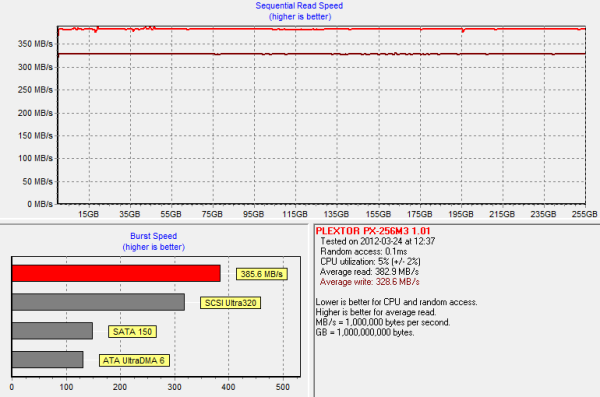
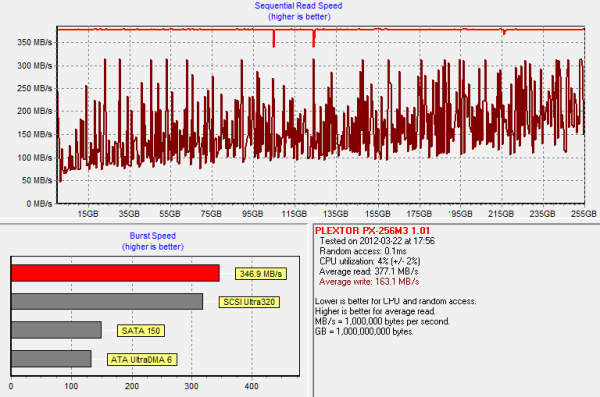
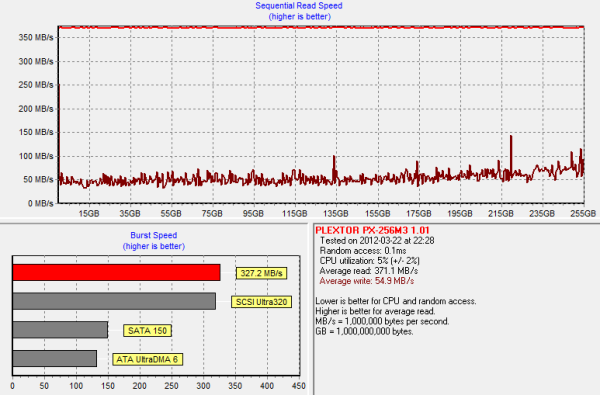
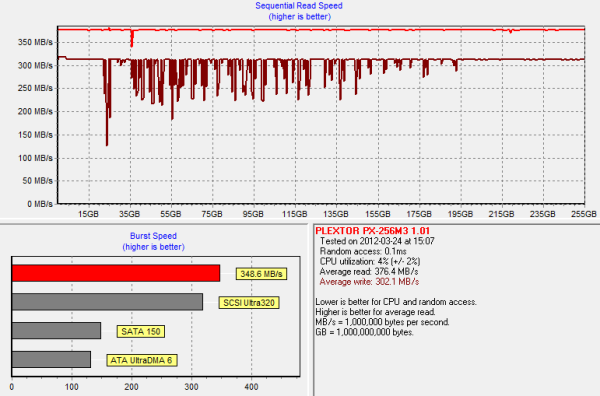
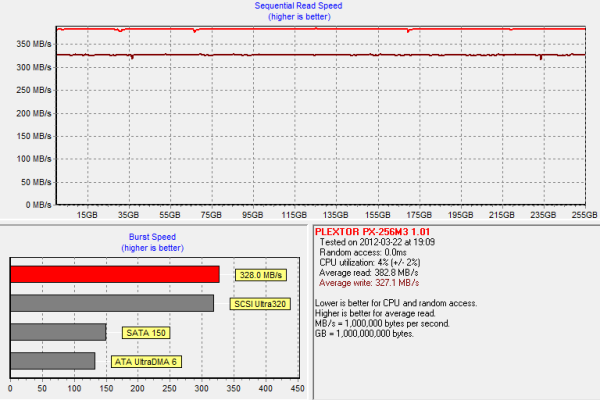








113 Comments
View All Comments
Kristian Vättö - Sunday, April 8, 2012 - link
Then the thanks should go to the man himself, aka Anand :-)wvh - Thursday, April 5, 2012 - link
We're not criticising him, just teaching him the smell of old farts.tnicks - Thursday, April 5, 2012 - link
Yep. I remember getting one of the first 2x burners back in the day from Plextor for ~$450 dollars. I still have nightmares of buffer underrun errors turning my $10/ea dollar blank cds into coasters.The0ne - Thursday, April 12, 2012 - link
Yep. Their products back then were high quality but came at a cost. To give an example, I tested and qualify Plextor CD/DVD drives for use in our system entirely despite the cost. That's how good and reliable they were.I am, however, shocked that the review started off about not knowing about the company though. Plextor has been around for ages with good products, although their presence has been little here in the US. I imagine most that don't know about the company would be young in age, very young.
Impulses - Thursday, April 5, 2012 - link
Will you guys be keeping this drive in a production system to see how it does long term?Kristian Vättö - Thursday, April 5, 2012 - link
I'm using it as a boot drive in my main system at the moment. So far so good.ac2 - Friday, April 6, 2012 - link
Kristian, you say correctly say "64GB and 128GB capacities are often the most popular capacities right now"And yet AT continues to persist with reviews of 200GB and up drives in almost all instances... It may be what the manufacturers are sending you but we expect better...
iwod - Thursday, April 5, 2012 - link
I thought there is a New Marvell controller coming out soon?Kristian Vättö - Thursday, April 5, 2012 - link
Marvell announced the 88SS9187 a couple of weeks ago but it will take a while before manufacturers release SSD based on it.bji - Thursday, April 5, 2012 - link
Marvell is right across the street from me. Well, across the highway anyway. When I ride my bike to work I go through their campus.A year or two ago I was thinking how exciting the SSD controller concept was; I thought that there must be lots of neat algorithmic tricks that can be played to hide the performance issues with block-erase flash memory and it sounded like a very intruiging problem to work on.
Too bad I didn't realize that Marvell would be working on SSD controllers (although I suspected they might). I should have popped across the highway and seen if I could get a job ... although, being a software developer with little experience in embedded controllers, it's unlikely they would have been interested.